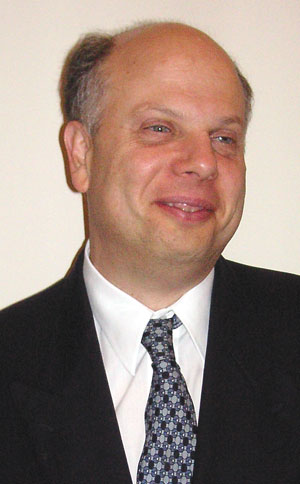Toronto lawyer David Lepofsky’s experience in advocating for disability issues over the last three decades can be divided up into as many as five different capacities, from legislative advocacy, to committee work, to teaching.


His work in this area is extensive, but has always been a voluntary role for Lepofsky, one he undertakes along with his full caseload as counsel with the Crown law office, criminal, at the Ministry of the Attorney General.
“I’ve got a full-time heavy caseload, and I do this on my own time and its something I love doing and I’ve spent a lot of time doing, but whether its evenings or weekends or late at night or over lunch or over breakfast or on time away from work, I do them both,” he says.
On a personal level, Lepofsky, who is blind, says he enjoys the fact that his advocacy work is a part of his life, but not his whole life.
“I have a career, and other interests. It’s the thing that attracts a certain amount of attention, but it’s not all I do and I think that’s helpful too. It’s important to have that kind of diversity.”
His work is well respected in the community. As Justice Alvin B. Rosenberg wrote in the first paragraph of a 2005 Ontario Human Rights Commission ruling in which Lepofsky was involved, “The complainant, David Lepofsky, is a Toronto lawyer who is and was at all material times totally blind. Notwithstanding his blindness, he has accomplished an incredible amount during his career to date.”
Community advocacy is something Lepofsky has been involved in since his days in university and it has taken many forms. Predominantly, Lepofsky has advocated for legislation at several different levels, including back in 1980, when he and others were fighting to have disability included in the Charter of Rights and Freedoms’ equality provision, and subsequently in the Human Rights Code.
For 10 years, starting in the mid-1990s, he also led the campaign for a new disability/accessibility law in the province.
Most recently, Lepofsky was involved in opposing the Ontario government’s changes to the Ontario Human Rights Commission in Bill 107, which was passed late last year. The bill is set to transform the roles of the Ontario Human Rights Commission and Ontario Human Rights Tribunal, as individual claims will no longer be filed with the commission, but instead filed directly with the tribunal, while the commission will take on more of a role in public education, advocacy, and investigating human-rights issues.
Attracting a significant amount of media attention were two recent cases against the Toronto Transit Commission at the Ontario Human Rights Tribunal, in which Lepofsky was a complainant. The first led to a ruling in 2005 requiring all subway stops to be announced. Last month, the tribunal again ruled in Lepofsky’s favour, requiring all bus and streetcar stops to be announced.
Part of Lepofsky’s advocacy work has also involved teaching law students, lawyers, and judges, as well as non-legal professionals, about disability issues, as well as writing a number of publications on the subject. Lepofsky was also appointed to a committee established two years ago at the opening of the courts, aimed at making the courts system disability-accessible.
The committee’s report was released earlier this year and Lepofsky will be serving on a permanent committee to oversee its implementation.
“If people with disabilities can’t get access to court, they’re going to have a whole lot of trouble getting their rights enforced,” he says.
Although cases such as those involving the TTC are more visible to the public, Lepofsky says he spends substantial time with community groups or individuals conducting sessions on doing advocacy, such as how to advocate a platform, mediate, and meet with a member of the legislature. He also gives talks to law students on social-justice advocacy, which he says is a skill set that should be taught in law school but is not at the moment.
An increasing number of law students today are interested in this area for work, he says, and as a result he has received many calls and students coming up to him at conferences who would like to get involved in advocacy work in the area of disability.
“I think one of the challenges facing the legal profession, including the private bar, is to pick up on that,” he says, adding that there is a lot of room for pro bono work in the area as well.
Lepofsky adds that there is huge support for this type of advocacy for the community, but there is also a lot of need that is not met and it is going to get worse, largely because of the changes to the role of the human rights commission, he says.
“Under the new regime, under Bill 107, the government said they would set up a legal support centre that’s going to service everybody. That legal support centre has a budget of $3 million a year, which is one quarter of what the human rights commission gets for the same function, investigating, and prosecuting cases,” he says.
“There’s a huge thirst within the world of people with disabilities and disability organizations for this kind of advocacy and a real receptiveness to it, huge unmet needs. And the legal profession, I regret, has not historically stepped into the breach as much as I would wish it would,” he says.
While Lepofsky says he is unsure of the number of lawyers who are doing the same type of community advocacy work as he is, he says that there is tons of room for more people to do it and it is very rewarding work.
The interesting thing about disability-related issues, says Lepofsky, is that there is an overwhelming support out there for the issues when you explain them to the community.
“The reason is that disability actually touches everybody’s life. Everybody either has one or will get one, and so it’s something that everybody has an interest in and so one of the things that helps when you do this is you talk to people and people do acknowledge that there is a lot of support out there when [they] learn about it,” he says.


 His work in this area is extensive, but has always been a voluntary role for Lepofsky, one he undertakes along with his full caseload as counsel with the Crown law office, criminal, at the Ministry of the Attorney General.
His work in this area is extensive, but has always been a voluntary role for Lepofsky, one he undertakes along with his full caseload as counsel with the Crown law office, criminal, at the Ministry of the Attorney General.